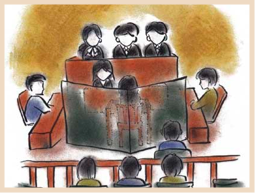
Todd Jay Leonard, Blog


When I first came to Japan, divorce was still rather rare. Only occasionally did I meet someone who had divorced. Today, the numbers are catching up rather quickly with those in the United States.
It’s still not as common here, and there tends to be a negative stigma still associated with divorce in Japan (especially toward women), but slowly society is making allowances for divorcées — primarily because of its prevalence and because people have no choice. More and more families are being touched by divorce, either directly or indirectly.
Divorce is quite easy in Japan. All that has to be done legally is for both people to have mutual consent; they must affix their personal seal (hanko) on an official form and then have it registered at the city office. If both agree to it, then it is a done deal. There is no need to have a family court involved. It is accepted and settled upon filing.
This type of system is quite rare in most other countries and is probably one of the easiest in the world. I read where about 90 percent of couples in Japan who divorce do so in this manner.
The idea of “joint custody” is a totally foreign concept in Japan. Recently, I assigned students in my culture class an article to read about an American family that showed just how complicated a joint custody arrangement can be. The parents were jostling and arguing about whose turn it was to have the child that week. The boy in the article seemed bewildered and sedately resigned to the process as his parents divided his time between them.
This system is so common in the U.S. that kids don’t think anything about being ferried from parent to parent each week, on weekends, separate but equal vacation time, and so on. It is but one aspect of American family life that has become ordinary.
In Japan, there is no system of “joint custody,” and this could be due to cultural reasons. Legally, only one parent after the divorce has sole custody, and this largely has to do with the fact that the parents no longer are legally bound to one another, so they are viewed by society as being completely separate.
The parent who doesn’t have custody is expected to participate in the financial cost of raising the child by sharing the expenses associated with the child. This is usually the father. An overwhelming majority of custody cases in Japan are awarded to the mother.
The parent who doesn’t have custody is allowed visitation, but it isn’t expressly stipulated in the divorce settlement. It is considered a natural right of a parent to be able to see his or her child, call by telephone or exchange letters. There is no “legal provision” for these types of contacts, but it is allowed as a matter of precedent and practice.
It is my observation, though, that often the parent who does not have legal custody generally does not see his or her children regularly, if ever. Once the marriage is severed legally, it seems that all association is then cut off, except for financial remuneration as a sort of “support” payment. This, too, is difficult at times for the custodial parent to force the other parent to contribute financially if the other parent refuses.
Interestingly, with more and more Japanese marrying foreigners, it is only logical that a certain percentage of these marriages end in divorce. This is causing the courts to rethink some of the customs associated with divorce because Westerners, especially North Americans, want and demand some sort of “joint custody” arrangement. At times, it does leave judges scratching their heads trying to figure out how to amicably solve these types of disputes.
A recent Japanese trend that is somewhat surprising is the high percentage of divorces between couples who are in their “golden years”; after the children are raised and on their own, a number of couples (after decades of marriage) decide to call it quits. Perhaps the children were the bond that held the couple together, and when they finished raising the children, they were at a loss as to how to interact with one another one-on-one.
Also, traditionally, with the father working outside the home — often married to his career and spending most days, evenings and weekends with work colleagues — the wife feels her personal space is invaded when he retires and sometimes decides not to spend the rest of her life serving him. So, she seeks a divorce from him.
I saw a talk show where a woman in her 60s was talking about her recent divorce. She said that when her children were at home, then in college, she had a purpose. But when her children married and her husband retired from his job, she decided that she preferred to be alone rather than to have to put up with him every day. When he worked, she felt she had some freedom to do as she pleased, but after he was home day in and day out, she couldn’t stand to be around him.
For every older couple that divorces, there are probably several couples that have worked out a sort of divorce without legally going to the trouble to dissolve the marriage. These couples often live in the same home but live separately. The wife may live in the downstairs and the husband upstairs, never exchanging greetings and going about their lives as if they were divorced.
This system allows them to save face by not going through the actual public humiliation of a divorce — the neighbors are none the wiser, most likely, thinking that everything is normal, when in fact the husband and wife are (for all practical reasons) “divorced.”
There is also a stigma associated with the children of divorced parents in Japan. Often parents wanting to divorce will wait until all of their children are married before filing. No upstanding family wants their child to marry someone from a divorced family, as if it were something contagious. So, they live in misery, putting on a happy façade until the children marry, then they divorce.
A Japanese friend was being pressured to get married by his mother — not because she necessarily wanted to have grandchildren but because she was eager to divorce his father. As soon as he married, it was only a matter of months before his parents divorced.
In my opinion, women in Japan certainly get the short end of the stick in divorces. There are a number of derogatory terms used toward women, such as “demodori” which refers to a woman who goes back to her parents’ home after the divorce. Another term, “kizumono,” means “damaged goods” like those that are on a discount table because they likely cannot be sold again — “seconds,” in other words. A more modern term used for both men and women is “batsu ichi” meaning “one failure,” like the English term “one strike.”
These terms are quite harsh, so it is understandable why people here are hesitant to divorce — even those who desperately need to — because of the stigma associated with them afterwards by society.
In America, the majority of divorced people eventually remarry; but in Japan, this is not the case. Younger people are more apt to remarry, but the majority of middle-aged to older Japanese who divorce often do not remarry. Perhaps they don’t want to chance it again.
By TODD JAY LEONARD
Columnist
Divorce in Japan varies greatly from that in the United States
Monday, July 17, 2006






